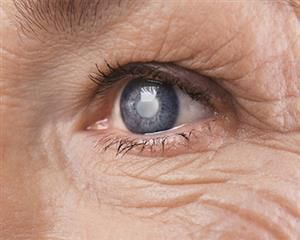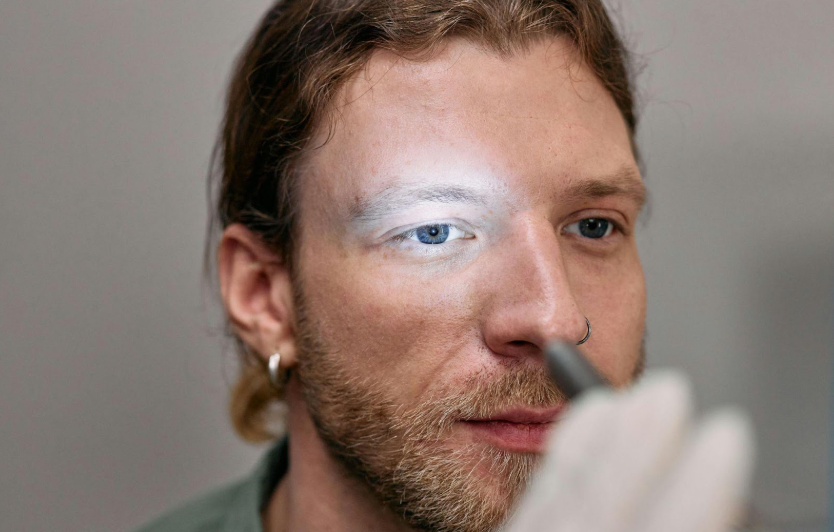Causes & Symptoms Of Cataract Related Eye Conditions
 The eye’s crystalline lens sits is located just behind the pupil and functions along with the cornea
to focus light on the retina. As we age, proteins in this crystalline lens clump together, which creates clouding and hardening of the lens that can eventually affect our vision. This clouding is considered a cataract, whether there has been a significant reduction vision or not. The most common symptoms of cataracts are blurring and dimming of vision. Let’s take a closer looks at causes, symptoms, and treatments of cataracts:
The eye’s crystalline lens sits is located just behind the pupil and functions along with the cornea
to focus light on the retina. As we age, proteins in this crystalline lens clump together, which creates clouding and hardening of the lens that can eventually affect our vision. This clouding is considered a cataract, whether there has been a significant reduction vision or not. The most common symptoms of cataracts are blurring and dimming of vision. Let’s take a closer looks at causes, symptoms, and treatments of cataracts:
What Causes Cataracts?
Cataracts are quite common. In fact, the National Eye Institute (NEI) estimates that there will be up to 50 million cataract diagnoses in the U.S. by 2050. Around age 40, the normal proteins in the eye’s lens start to break down and clump together, which is what causes clouding and hardening of the lens over time. Those over age 60 usually start to have some clouding of their lenses, although vision problems may not be apparent until years later.
Other factors that increase the risk of developing cataracts include:
- Heredity: risk increases if other family members have cataracts.
- Health: certain medical problems, such as diabetes , increase risk of cataracts.
- Having had an eye injury , eye surgery, or radiation treatments on your upper body.
- Sun exposure, especially without sunglasses that protect your eyes from damaging ultraviolet (UV) rays.
- Using certain medications such as corticosteroids, which may cause early formation of cataracts.
Most age-related cataracts develop gradually over time as people age. For others, such as people with diabetes or younger people, cataracts can develop more rapidly. Ophthalmologists cannot predict how quickly a person’s cataract will develop.
What Are The Symptoms of Cataracts?
The main symptoms of cataracts are shared with many other eye conditions, so a complete eye examination including dialysis is required to ensure a proper diagnosis of cataracts. As mentioned, cataracts usually begin forming before any vision problems are apparent. Once cataracts begin to affect vision, you may experience:
- Blurry vision
- Dimmed vision, bright colors appear faded or yellow
- Double vision in one eye only
- Increased sensitivity to light
- Seeing halos around lights
- Difficulty seeing at night
- Needing more light when you read
- Decreased depth perception
Prevention & Treatment of Cataracts
If you have cataracts or know that you’re at a higher risk of developing them, you may be able to slow down the progression of your cataracts. Protecting your eyes from sunlight is the best way to do this. Wear sunglasses that protect your eyes by screening out the sun’s ultraviolet (UV) light rays. You may also wear regular eyeglasses that have a clear, anti-UV coating. Talk with your eye doctor about the options that are best for you.
When you begin experiencing any of the symptoms above and you decide it’s time to seek treatment for your cataracts, the first step will be for an ophthalmologist to do a comprehensive eye examination to evaluate the exact extent and nature of your cataracts. The ophthalmologist will examine the front part of your eye, including the lens, with a biomicroscope, also called a slit lamp. He or she will also examine the back of your eye with an ophthalmoscope.
Surgery
Fortunately, cataract surgery is as common as the condition itself, and is typically very successful for restoring vision. During cataract surgery, the eye surgeon will remove the cloudy and hardened lens and replace it with an artificial lens called an intraocular lens (or IOL). Depending on your vision, a specific intraocular lens may be used to correct other distortions in vision, such as nearsightedness or farsightedness. If this is the case for you, having cataract surgery may reduce or even eliminate your dependence on corrective eyeglasses.
Will I Still Need Glasses?
Many people who have cataract surgery will still need to wear glasses after the sight-saving procedure. Studies show that 30 to 50 percent of people who have cataract surgery still need glasses after surgery. However, a new kind of artificial lens recently approved by the FDA could help more people get rid of their glasses after cataract surgery.
During standard cataract surgery, the IOL replaces the eye’s natural lens, and functions to bend, or refract, light rays that enter the eye to help you see correctly.
Your eye surgeon will make careful measurements of your eye to perform surgery precisely with the intention that your vision will be fully corrected. However, 20/20 vision without glasses isn’t always achievable after surgery because the surgeon can only estimate where the new lens will fit in the eye after it heals from surgery.
Determining exactly where in the eye the new lens will end up once the eye heals determines how close the surgeon restore 20/20 vision without glasses. However, a new lens—a light-adjustable intraocular lens or RxLAL—that the FDA recently approved may solve this problem. This is not available yet but hopefully will be soon.
This unique lens will allow ophthalmologists to apply your prescription directly into the lens after your eye has healed from surgery. This is done by applying a low-intensity beam of ultraviolet light from a specialized light delivery device. Because the lens is made of a photoreactive silicone material, the light beam is able to subtly change the shape of the surface of the lens, which could correct any vision problems still existing after cataract surgery.
The FDA study showed that approximately twice as many patients had 20/20 vision restored after this RxLAL procedure compared to standard IOLs. Your eye doctor will discuss which surgical procedure is best for you. Regardless, rest assured that even though cataract surgery is a complex procedure it’s also a very common procedure.
Baptist Eye Surgeons has several eye surgeons who specialize in cataract implant surgeries. All cataract surgeries are performed on an outpatient basis, allowing for us to safely perform the procedure while limiting the impact on your daily routine as much as possible. While it usually takes several weeks for your eye to fully heal, most patients are able to return to office-type work within a few days and to manual labor after one week.
To know more about what to expect before, during, and after cataract surgery, check out our free eBook, The Complete Guide to Cataract Surgery.
Baptist Eye Surgeons is an ophthalmological practice dedicated to providing quality eye care to patients whose needs range from routine comprehensive eye examinations to the treatment of vision-loss eye diseases such as cataracts. To request an appointment or get directions to our Knoxville and Morristown locations, visit our website. Call us at 865-579-3920 for more information or visit us online to schedule an appointment.


MORRISTOWN
SEVIERVILLE
TENNESSEE VALLEY - LASER CENTER
TENNESSEE VALLEY - EYE CENTER



